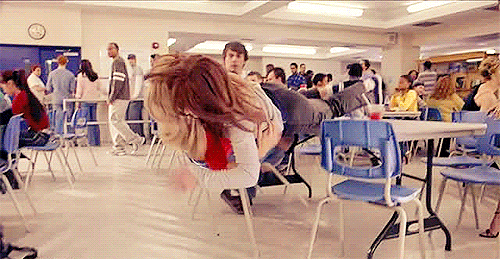Why You Shouldn’t Do The #TwizzlerChallenge This Autism Awareness Month
Today is Autism Awareness Day. Time to bust some myths.

April is Autism Awareness Month, in which Autism organisations around the world run awareness campaigns – like ‘Light It Up Blue’ and the #Twizzler Challenge — to educate people about Autism. But many Autistic people like myself are growing disillusioned with these campaigns and the organisations that run them, which – in an effort to simplify Autism – end up spreading misinformation instead.
You probably know someone on the Autism spectrum – they could be a sibling, family member, your best friend, colleague, partner, or drinking buddy. They might not speak about Autism openly, but they could still be negatively affected by ignorance about it.
Today is Autism Awareness Day: as good an excuse as any to read up on some things you should know about Autism, and the Autistic community.
–
No, Autism Is Not A Disease
First, let’s get the language right.
Many Autistic people prefer Identity First Language (“Autistic person”) not Person First Language (“person with Autism”), usually to combat the idea that Autism is entirely separate from a person’s identity. (Some parent groups do prefer person first language, though).
Do not call Autism a “disease” or an “epidemic”, don’t compare Autism to AIDS or cancer, and avoid the term “Autism sufferer”, too. Autism is a neurodevelopmental spectrum disorder, which means Autistic people have vastly different experiences of the condition. Most portrayals of Autistic people in the media feature young, white, asexual men, who are good at maths, science and IT, and who don’t get jokes. In fact, Autistic people are a diverse bunch of people with varying interests, sexualities, and professions. Some of them even get sarcasm! Shocking, I know.

Terms like “high functioning” and “low functioning” are used to define how disabled Autistic people are. Some Autistic people refrain from using those terms, though, arguing that “high functioning” overlooks difficulties, and “low functioning” overlooks abilities.
There are even vast splits in the community when it comes to how Autism should be treated. Some people and organisations, notably the American organisation Autism Speaks, subscribe to the Medical Model of Disability (MMoD); they believe Autism should be cured or prevented. On the other hand, those who subscribe to Neurodiversity (a part of the Social Model of Disability (SMoD)) think that Autism should be accepted by society, and that Autistic people should have access to support, equipment, and therapies that do not aim to ‘get rid’ of Autism.
There are so many issues that Neurodiversity advocates and medical model supporters disagree on, from the puzzle piece symbol, to the ethics of certain therapies. And sometimes, it gets heated.

There’s a misconception that the Autism Rights Movement only favours those with milder forms of Autism, but there are a lot of non-speaking Autism rights activists too. Amy Sequenzia is an outspoken non-speaking Autistic writer and activist . Tim Chan is also one to watch. He is also a writer and poet, and he gave this speech at TEDx Melbourne in 2013.
Many Autistic people are proud of who they are, despite their challenges. Saying, ‘You seem normal’ or , ‘You must be very high functioning’, while intended as a compliment, is like saying to a gay friend, ‘You seem so straight’ or, ‘Don’t worry, you aren’t as bad as those other gays!’.
While most Autistic people will be understanding, as a general rule don’t say anything in this video:
–
The Problem With Autism Awareness Campaigns
The de-facto motto of the Autism Rights Movement — a social movement which subscribes to the Neurodiversity philosophy, and encourages Autistic self-advocacy — is ‘Nothing About Us, Without Us’. That’s because it’s rare for Autistic people to lead or even impact Autism organisations.
One of the Autism Rights Movement’s biggest opponents is Autism Speaks, the aforementioned American Autism organisation, and a leader in the sector. Many Autism Rights activists disagree with their MMoD outlook of Autism, the nature of their campaigns (including advertisments that portray Autism as a ‘child snatching’ disease), their endorsement of Applied Behaviour Analysis therapy (which aims to make Autistic people present as ‘less Autistic’), and the lack of Autistic representation in the leadership of the organisation — right now, there are no Autistic people in leadership roles at Autism Speaks.
Recently, the organisation launched #AutismSpeaks10 to get people to talk about how the organisation helped them. This backfired pretty drastically.
+++ BREAKING +++ Rare picture of @autismspeaks surfaced. #AutismSpeaks10 pic.twitter.com/RdlTMxMpsD
— Denise Linke (@pollys_pocket) February 21, 2015
Congrats to @autismspeaks for 10 years of harming families by convincing parents their own children are a tragic burden. #AutismSpeaks10
— Nick Walker (@WalkerSensei) February 22, 2015
One of the most popular awareness campaigns, ‘Light It Up Blue’ was founded by Autism Speaks. The campaign encourages people to wear blue on World Autism Awareness Day — April 2 — and to ‘light up’ iconic landmarks around the world with blue light, to represent Autism. The main issue that Autism Rights activists have with this campaign is the organisation that runs it, who, for the most part, portray Autism as a disease that can and should be cured.
In fact, the Autism Rights Movement finds a lot of Autism awareness campaigns to be problematic. While there are some excellent Autism organisations run and founded by Autistic people – including the Autism Self-Advocacy Network and the Autism Women’s Network (US) — mainstream campaigns run by organisations that have little to no Autistic people in leadership roles see Autism from an outsider’s perspective in their campaigns. And with a spectrum disorder as commonly misunderstood as this, that means their view of Autism can be superficial at best, and offensive at worse.
The #TwizzlerChallenge is a new awareness campaign which, much like ALS Ice Bucket Challenge, banks on virability: two people eat a Twizzler (a kind of red liquorice) at both ends until they meet, where they will inevitably kiss Lady And The Tramp style.
As this kissing at the end is socially ‘awkward’, it is apparently supposed to help people understand what it is like to be Autistic. The entire premise of the campaign is problematic, as it comes to this definite conclusion that being Autistic is awkward; it does not help society understand Autistic people at all.
Also watching two people slobbering on piece of rubbery red liquorice — ew.
Also, while we’re here: No, vaccines don’t cause Autism. There’s overwhelming evidence proving Andrew Wakefield’s 1998 study was fraudulent. On a similar thread, not eating a ‘Paleo’ diet doesn’t cause Autism either. If you must insist that Paleo is best, please enjoy your bone-liver poison soup.
–
Julia Pillai is a student at Monash, a community broadcaster on SYN, and a sub-editor of Lots Wife Magazine.
UPDATE 21/04: The author has retracted her support of two Victorian organisations, and the article has been edited accordingly.
Feature screen shot via Larry Emdur on Instagram.

